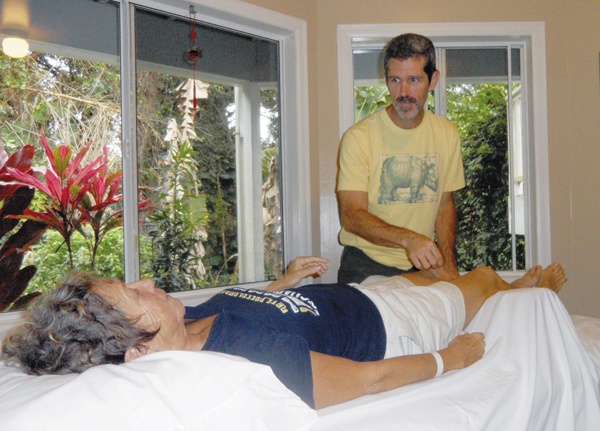• Editor’s note: This is the first of a three-part series by Kauai resident Anna Myers on her knee surgery. She writes on the physical, mental and spiritual aspects of the operation. Bone on bone, nine years of discomfort, swelling and
• Editor’s note: This is the first of a three-part series by Kauai resident Anna Myers on her knee surgery. She writes on the physical, mental and spiritual aspects of the operation.
Bone on bone, nine years of discomfort, swelling and making do.
My family, friends, doctors and several orthopedic surgeons all said. “Go for it.” Get new knees? That’s a scary thought. I’m thankful for my overall good health and especially for health insurance.
I interviewed three surgeons to decide who best suited my needs and personality. I looked at things like their experience, ability to listen and make eye contact as well as education and training.
I found quite a difference among the surgeons in all of these criteria. I decided that Dr. Derek S. Johnson at the Bone and Joint Center at Wilcox Memorial Hospital was the right surgeon for me. And a big advantage was that I could stay on Kauai for the surgery and all the procedures leading up to and after it.
After scheduling the procedure, I made a list of what I need to do before the big date. But am I ready mentally, physically and emotionally for such a surgery? I’m more than my body, so I want to be prepared in all ways.
The following are some of the things that I needed to do. All are important to do about a month before surgery.
1. Decide on a physical therapist for after surgery. Talk with friends and get recommendations. Visit the therapists and make a choice. Make appointments for after surgery with that therapist.
2. Borrow, buy or rent a walker, elevated toilet seat, cane and hand-held shower attachment.
3. Make sure to have help at home so you can get released from the hospital sooner.
4. And probably most important of all: Begin treatments to address nervousness and fear around the surgical process.
I consider myself to be a mainstream health consumer who is interested in and open to complementary medicine (alternatives) and I want to cover all bases in my preparation and recognize the spiritual, mental and emotional sides of surgery.
Western medicine traditionally looks only at the physical side of things, and I do want my mind and spirit ready for this procedure as well. Following is a list of the treatments that I wish to experience: Acupuncture, hypnotherapy, relaxation breath therapy, meditation and physical exercise are among the treatments on my list.
Part one of my preparation looked at the old Chinese treatment, acupuncture.
I contacted Mel Drisko, MSTCM, LAc, which means he is a traditional Chinese medicine practitioner, who came to Kauai from Denver. He was an instructor and doctor at the University of Colorado Medical Center for 10 years and has operated his Clinic for Acupuncture Medicine on the North Shore for four years. I like his credentials and know he will not be some “far out” practitioner.
I made an appointment with Drisko and learned that even though major surgeries are becoming more advanced, patients still must prepare themselves and rehabilitate afterward. Immune deficient patients have longer recovery times. Using acupuncture prior to surgery can improve the immune system and can shorten recovery time and allow for full rehabilitation. This sounds great to me!
Numerous research studies have shown the benefits of acupuncture pre and post-operatively in joint reconstruction, spinal surgery, oncological, gastrointestinal, and thoracic surgery. I think this is important knowledge and I want others to know about this important alternative, even though I am only looking at joint replacement.
It was explained that the nervous system must be trained to get the benefits from treatments and that the effects are cumulative. Just as one round of exercise doesn’t make you fit, you need to train on multiple days. OK, I’m “in” because I want the benefits before and after surgery, which include:
• Boosting immune factors
• Reducing nausea and vomiting from anesthesia, the most common side effect experienced by patients after surgery
• Activating blood flow to joints, ligaments and tendons and increasing range of motion more easily during physical therapy
• Less swelling at surgical site and limbs
• Reduced narcotic pain medication use following surgery
Since I have never had traditional acupuncture treatments, I am very interested in the whole process. I find that the needles produce no pain, but there is some achiness around the needle site. This, I am told, is an indication that the treatment is working. Also, I am learning that the nervous system throughout the body is connected to each of the points where the needles are inserted and my pulse reacts to the acupuncture treatment by staying slightly elevated while I am reclining. Very interesting. Another sign that the treatment is working?
After four treatments in the hands of this caring physician, I feel confident that this treatment will aid my surgery and recovery from surgery. I find Drisko very professional and competent and would recommend him.


